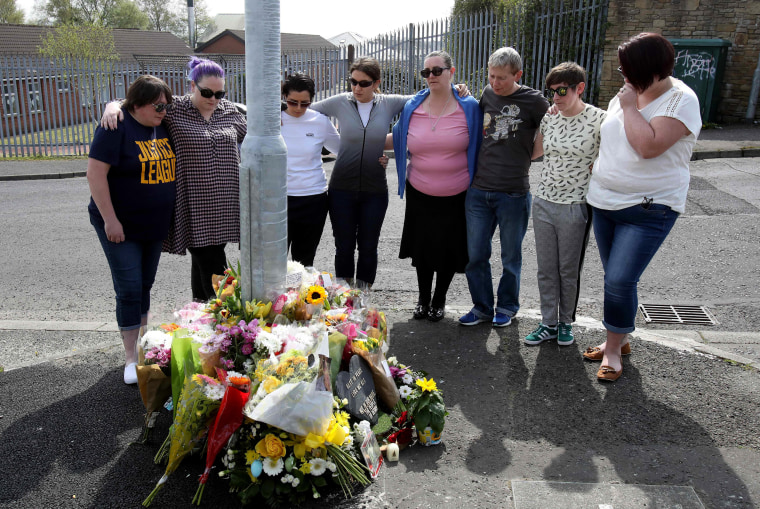A dissident Irish republican group called the New IRA has reportedly claimed responsibility for killing journalist Lyra McKee during a riot last week in Northern Ireland.
The paramilitary organization said Monday that one of its volunteers had shot McKee by mistake while aiming at police "enemy forces" in the city of Londonderry, which is also known as Derry.
According to a statement sent to The Irish News, the group said it offered its "full and sincere apologies" to McKee's family and friends.
The newspaper said the statement was sent using a recognized code word, but its veracity has not been independently confirmed by NBC News.
The apology was widely rejected, with people across the region's polarized political spectrum coming together to condemn McKee's shooting.

On Tuesday, a 57-year-old woman was arrested in connection with the shooting and held in the Northern Irish capital of Belfast under terrorism laws, police said. Two teenagers previously held have been released without charge.
"Lyra was killed by shots that were fired indiscriminately … in a residential area, at a time when there were large numbers of local people on the street, including children," Detective Superintendent Jason Murphy told reporters Saturday.
"The brutal nature of the attack has sent shockwaves around the world," Murphy added. "The gunman showed no thought for who may have been killed or injured when he fired these shots."
At just 29, McKee was regarded as a gifted investigative journalist, not only covering the legacy of her homeland's violent past but also talking about growing up as a gay person in Belfast.
Her death is the latest sign that, while the conflict that plagued Northern Ireland for decades has calmed, it has far from vanished.
The New IRA is the most recent paramilitary organization to use the name of the Irish Republican Army, after the original incarnation that fought for Irish independence starting in 1919. Authorities believe the New IRA to be the country's largest active dissident organization.
It was formed in 2012 out of smaller splinter groups including the Real IRA, which was behind the 1998 Omagh bombing and classified as a terrorist organization by the State Department.
The British government considers any organization with IRA in its name as a terrorist group.
The New IRA aims to continue the decades-long struggle to unite Northern Ireland, which is part of the United Kingdom, and the Irish Republic, which is a separate country.
This sectarian divide — between mainly Catholic "republicans," mainly protestant "loyalists" and British authorities — resulted in a three-decade conflict called "the Troubles," which claimed 3,000 lives. It ended with a 1998 peace deal.
The New IRA rejects this agreement.
As well as being linked to several murders in recent years, the group claimed responsibility for sending four parcel bombs to Glasgow University, London's Waterloo Station and buildings around two airports in the British capital.
The group did apologize for McKee's death this week, but in the same breath also blamed British police for an "incursion" that "provoked rioting" in Londonderry's mainly Catholic neighborhood of Creggan.

It added that "we have instructed our volunteers to take the utmost care in future when engaging the enemy, and put in place measures to help ensure this."
While largely forgotten in mainland Britain, the Northern Irish issue has crept back into headlines in recent years thanks to Brexit.
Until now, both Northern Ireland and the Irish Republic have been part of the European Union. This means their border can be all but invisible, thanks to the E.U.'s trade regulations allowing members to operate almost like a single country.
In fact, erasing the symbolic border was a key tenet of the Good Friday Agreement, the name of the 1998 peace deal that ended "the Troubles." After Brexit, Britain, including Northern Ireland, might lose these shared regulations that allow this border to remain invisible.
Many fear that returning to a "hard border" — perhaps dotted with guard posts and personnel — will become a target for attacks by paramilitaries seeking to stir up unrest.
Even now, Britain's domestic counterintelligence agency, MI5, puts almost one quarter of its resources toward "Northern Ireland-related terrorism," according to government figures.
While not at the level of the 1970s, last year alone there were 16 paramilitary shootings, 15 bombings and 159 people arrested under terror laws in Northern Ireland, police said.
